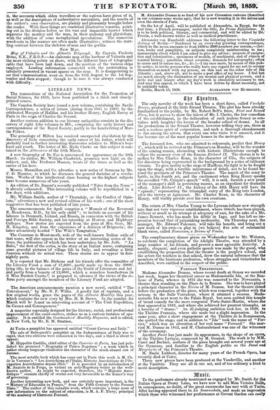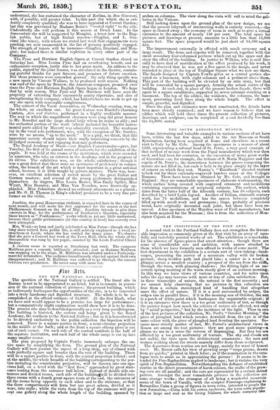To the performers already mentioned as engaged by Mr. Smith
for the Italian Opera at Drury Lane, we have now to add Miss Victoire Balfe, in consequence, no doubt, of the great success she has met with at Turin. After having appeared there in La Sonnambula, and made an impresiiO4 which those who witnessed her performance at Covent Garden can may
understand, she has sustained the character of Zerlina, in Don Giovanni, with, if possible, still greater eclat. In this part (for which she is evi- dently completely qualified) she was to have appeared at Covent Garden; but this was prevented by Madame Bosio's "vested right" to the role. Undoubtedly she will perform it this season at Drury Lane. In the &mamba& she will be supported by Mongini, a tenor new to the Eng- lish public, but of high Italian renown—Giuglini, and L. Gra- ziani (the tenor), with whom we stated last week that engagements were pending, are now enumerated in the list of persons positively en The strength of tenors will be immense—Giuglini, Graziani, and on- gini; but indeed there is similar repletion in every other part of the Company.
The Pyne and Harrison English Opera at Covent Garden closed on Saturday last. Miss Louisa Pyne had an overflowing benefit, and an enthusiastic reception, justly due to her great merit. An address to the public, signed by thejoint lessees, was circulated in the theatre, contain- ing grateful thanks for past favours, and promises of future exertion. But these promises were somewhat general : the only thing specific was a new opera by Vincent Wallace, to be produced next season. Nothing was said of the opera by Bristow, the American composer, promised ever since the Pyne and Harrison English Opera began in London. We hope that by next season, Miss Pyne and Mr. Harrison will have seen the propriety of extending their excessively scanty repertoire, and also of strengthening their company, which has hitherto been too weak to get up any one opera with reasonable completeness. The concert of the Vocal Association, on Wednesday evening, was, on the whole, an excellent one. Its great feature was Handers charming Cantata, Ads and Galatea, performed in a highly creditable manner. The way in which the magnificent choruses were sung did great honour to.Mr. Benedict and the large choral body whom he trains so ably; and the orchestral portion of the work (which included the beautiful instru- mental parts added by Mozart) was admirably executed. The weakness lay in the vocal solo performers, who, with the exception of Mr. Santley, were by no means, "up to the mark." It is a pity, we think, that this important society should injure their really interesting concerts by the ill:Judged economy of not engaging first-rate performers. The Royal Academy of Music—our English Conservatoire—gave, last Tuesday, the first of its annual series of concerts for the exhibition of the pupils. It was held at the rooms of the institution, which were crowded by amateurs, who take an interest in the Academy and in the progress of its ffieves. The exhibition was, on the whole, satisfactory; though it was a great defect that there were, no specimens of proficiency in compo- sition, the branch of the art which is most important in a great national school, because it is little taught by private masters. There was, how- ever, an excellent selection of sacred music by the great Italian and German masters; and several of the young performers distinguished theniselves. As singers, Miss Laura Baxter, Miss Emily Spiller, Miss Wyatt, Miss Bramley, and Miss Van Noorden, were deservedly ap- plauded. Miss Johnstone showed no ordinary attainments as a pianist ; and Mr.' G. H. Thomas (a King's scholar) promises to be a very fine per- former on the violin.



























 Previous page
Previous page